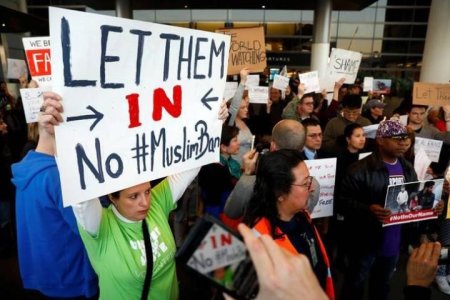Supreme Court Exempts Grandparents From Trump Travel Ban

WASHINGTON — The U.S. Supreme Court rejected on Wednesday a bid by President Donald Trump to include grandparents and other relatives in his travel ban on people from six Muslim-majority countries.
But in a partial win for Trump, the court gave the government more leeway to enforce a separate ban on refugees that was included in a March 6 executive order the president said was necessary for national security.
A federal judge had ruled against the government on the scope of both bans last Thursday, prompting the administration to seek Supreme Court intervention.
The high court's decision means that, for now, grandparents, grandchildren, aunts, uncles, nieces, nephews, cousins, and siblings-in-law are not covered by the 90-day travel ban on people from the six countries who want to enter the United States.
The court's action on refugees could block entry of up to 24,000 refugees who have a connection to a U.S. resettlement agency, according to court papers.
The brief order said the court's decision is temporary while the San Francisco-based 9th U.S. Circuit Court of Appeals considers a separate appeal on the same issue. Three of the conservatives on the court of nine justices noted that they would have granted Trump's request in full.
In a statement, Hawaii Attorney General Douglas Chin, who challenged the bans in court, said his office is preparing arguments for the 9th Circuit on the refugee issue, and said the Supreme Court ruling validated Hawaii's position.
"This confirms we were right to say that the Trump administration over-reached in trying to unilaterally keep families apart from each other," Chin said.
The Supreme Court also announced on Wednesday that it has scheduled oral arguments on broad questions on the lawfulness of the ban for Oct. 10.
The Trump administration last Friday asked the high court to overturn a decision on Thursday by a U.S. district judge in Hawaii, which limited the scope of the administration's temporary ban on travelers from Iran, Libya, Somalia, Sudan, Syria and Yemen and the 120-day ban on refugees.
Naureen Shah, senior director of campaigns at Amnesty International USA, said in a statement that the court's decision on refugees "jeopardizes the safety of thousands of people across the world including vulnerable families fleeing war and violence."
The latest round in the fight over Trump's executive order began after the Supreme Court intervened last month to partially revive the two bans. Both had been blocked by lower courts.
The Supreme Court said then that the bans could take effect, but that people with a "bona fide relationship" to a U.S. person or entity could not be barred.
The administration had narrowly interpreted that language, saying the ban would apply to grandparents and other family members, prompting the state of Hawaii to ask Hawaii-based U.S. District Judge Derrick Watson to expand the definition of who could be admitted. He ruled for the state late on Thursday.
In his decision, Watson harshly criticized the government's definition of close family relations as "the antithesis of common sense."
Watson also ruled that the assurance by a resettlement agency to provide basic services to a newly arrived refugee constitutes an adequate connection to the United States because it is a sufficiently formal and documented agreement that triggers responsibilities and compensation.
(Reporting by Lawrence Hurley; additional reporting by Mica Rosenberg and Andrew Chung in New York and Dan Levine in San Francisco; Editing by Grant McCool.)






















